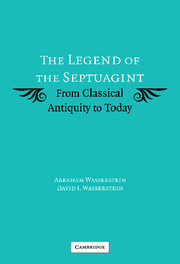Book contents
- Frontmatter
- Contents
- Preface and Acknowledgments
- Abbreviations
- Introduction
- 1 The Letter of Aristeas
- 2 The Hellenistic Jewish Tradition
- 3 The Rabbis and the Greek Bible
- 4 The Ptolemaic Changes
- 5 The Church Fathers and the Translation of the Septuagint
- 6 Among the Christians in the Orient
- 7 The Muslims and the Septuagint
- 8 Yosippon and the Story of the Seventy
- 9 Karaites, Samaritans and Rabbanite Jews in the Middle Ages
- 10 The Septuagint in the Renaissance and the Modern World
- Conclusion
- Appendix: In Partibus Infidelium: Zosimus of Panopolis
- Bibliography and Sources
- Index
2 - The Hellenistic Jewish Tradition
Published online by Cambridge University Press: 17 July 2009
- Frontmatter
- Contents
- Preface and Acknowledgments
- Abbreviations
- Introduction
- 1 The Letter of Aristeas
- 2 The Hellenistic Jewish Tradition
- 3 The Rabbis and the Greek Bible
- 4 The Ptolemaic Changes
- 5 The Church Fathers and the Translation of the Septuagint
- 6 Among the Christians in the Orient
- 7 The Muslims and the Septuagint
- 8 Yosippon and the Story of the Seventy
- 9 Karaites, Samaritans and Rabbanite Jews in the Middle Ages
- 10 The Septuagint in the Renaissance and the Modern World
- Conclusion
- Appendix: In Partibus Infidelium: Zosimus of Panopolis
- Bibliography and Sources
- Index
Summary
The first stage in the surviving testimony to the history of the Septuagint lies in the hellenistic Jewish tradition. This is as it should be, not only because the Septuagint was born in that community and not only because the legend of its birth there was a creation of a member of that community but also because that community was the largest and culturally the richest of all those to the west of Palestine in its time. From this point of view, indeed, we may be a little surprised at the paucity and thinness of the evidence that we have. The evidence consists in three parts. The first, associated with the name of Aristobulus, is of very dubious character. The third, from Josephus, is essentially a long quotation in the form of an extensive paraphrase, from the Letter of Aristeas, although there is also some information in the same writer's Against Apion. Only the second witness, Philo, offers testimony of real value and significance, and even what he has to say is not wholly free of difficulty.
ARISTOBULUS
Aristobulus is a most recalcitrant witness, even a slippery customer. He stands out among the small group of Jewish writers of the hellenistic age. Who was he? Did he ever exist? How many individuals, if any, lie hidden behind the name Aristobulus in our sources? How much of the writings attributed to him can be regarded as genuine? When was it composed? Is it all by a single person?
- Type
- Chapter
- Information
- The Legend of the SeptuagintFrom Classical Antiquity to Today, pp. 27 - 50Publisher: Cambridge University PressPrint publication year: 2006



